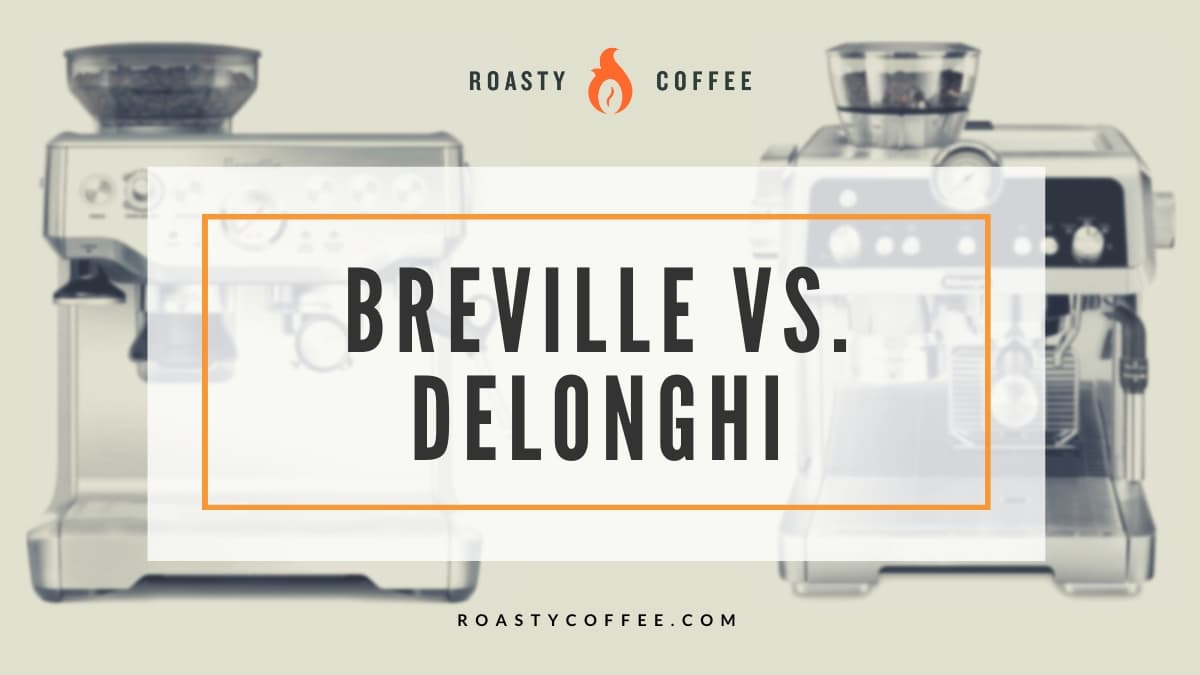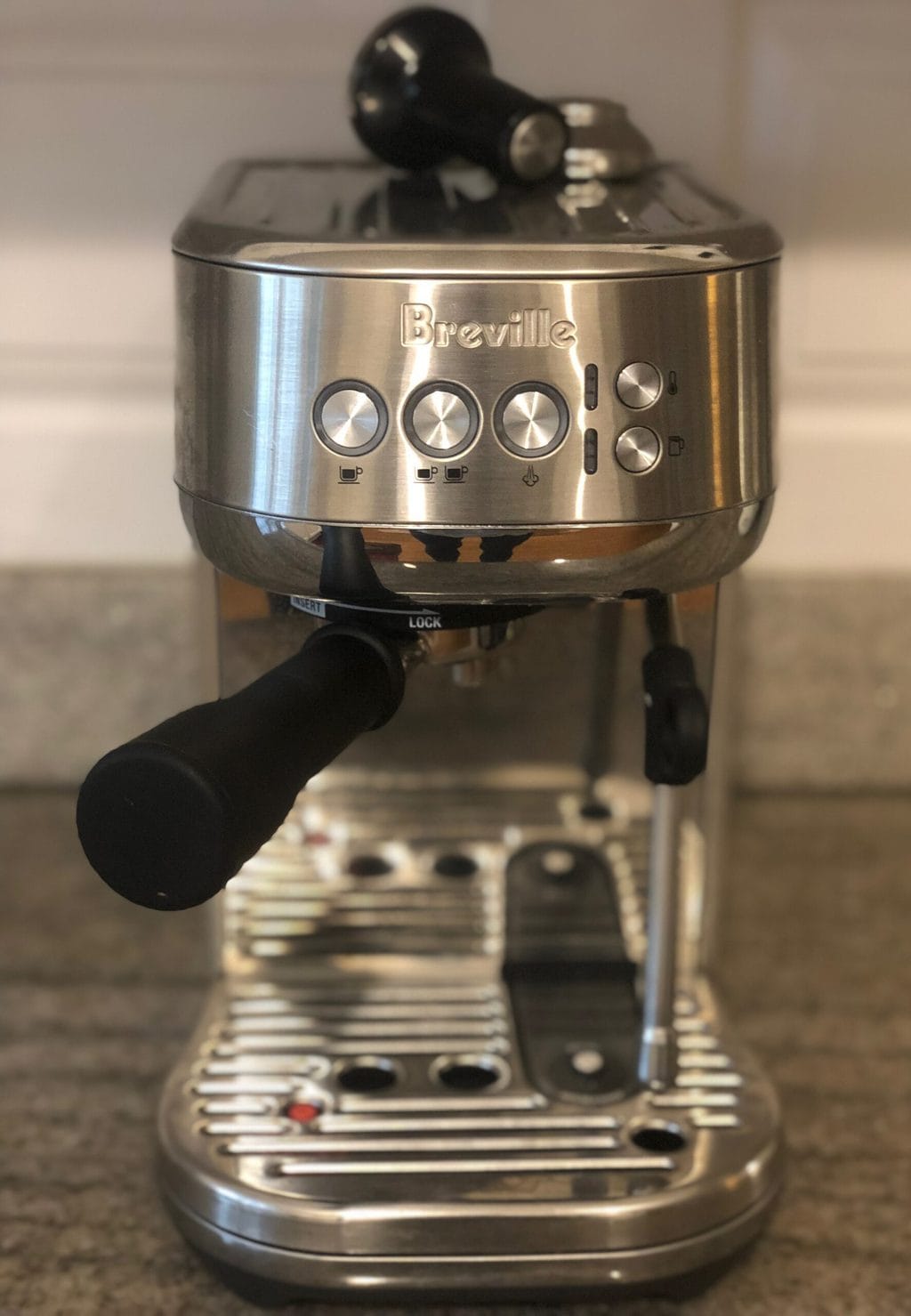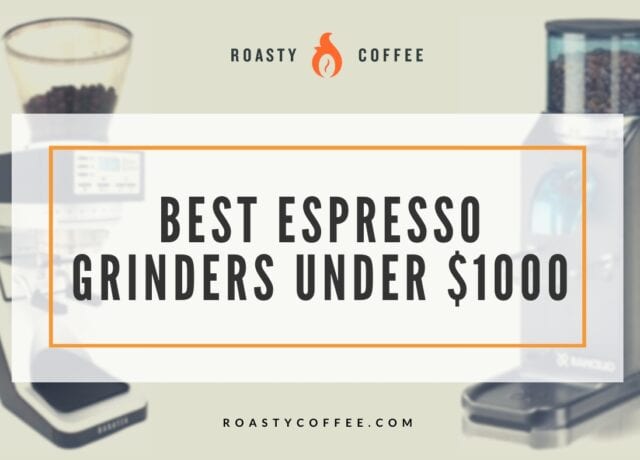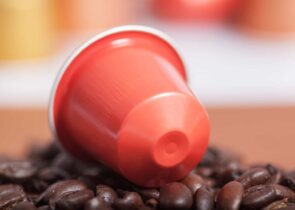When it comes to the espresso machine market, Breville and De’Longhi are two of the leading brand names. Each company’s lineup has several standouts, making it difficult to choose between them when you’re deciding on the best machine for brewing your morning coffee.
We believe Breville makes better semi-automatic machines, so you might want to take a look at their models if you fancy preparing perfect espresso pucks. But for high-convenience super-automatics, Delonghi’s options are hard to beat.
At a Glance: Breville vs De'Longhi
Of course, it’s not that simple, because both brands have excellent machines of different types and price ranges. So read on for a brief overview of each brand, plus a breakdown of some of their best machines. Then, you’ll be able to decide which espresso machine brand is perfect for pulling your daily shots of espresso.

Key Takeaways
- Breville and De’Longhi are titans in the home espresso machine market, with Breville being the go-to for semi-automatic models and De’Longhi for super-automatic ones.
- Both companies offer standout models like the Breville Barista Express and the De’Longhi EC155, catering to different skill levels and price points.
- Product lines of both companies include various machines, with extensive features such as integrated grinders, milk frothers, and programmable settings to fit any coffee enthusiast’s home barista dreams.
Breville? More Like Bae-ville!
Breville is a pretty prominent household name, especially in Australia, its mother country.
Though Harry Norville and Bill O’Brien founded the brand in 1932, Breville wouldn’t stake its claim in the small kitchen appliance market until 2001, when Housewares International Limited (later named the Breville Group Limited) acquired it.
Since then, Breville’s popularity has only grown, and many espresso coffee lovers all around the globe have one of these high-end brewers on their countertops.
In the UK and Europe, you’ll find Brevilles marketed under the Sage brand, but the models should be similar if not identical.
Where Are Breville Products Manufactured?
The company operates across Australia, New Zealand, Canada, the U.S., Hong Kong, and the United Kingdom (though there, you’ll find these products sold under the Sage by Heston Blumenthal name).
Famed for its superior customer service and top-notch quality, Breville designs and engineers all its products in Australia. However, many of them are assembled in China.
In for De’Long-haul
The family-owned De’Longhi brand began in 1902 as a small industrial parts manufacturer in Treviso, Italy.
Though De’Longhi’s first coffee machine debuted in 1993, the Italian brand wouldn’t establish itself as a leader in the espresso machine market until 2007, four years after launching its first super-automatic espresso machine, the De’Longhi Magnifica.
De’Longhi is most well-known for its accessible product range and is one of the brands responsible for bringing espresso bar capabilities to the general public. Even with De’Longhi’s budget-friendliness, the brand’s products still sport sleek designs.
Where Are De’Longhi Products Manufactured?
De’Longhi machines were once exclusively made in Italy. Now, though, a growing percentage of the brand’s products are put together in China.
Breville vs. De’Longhi: A Top Picks Showdown
Quick Summary: Breville vs. De'Longhi: A Top Picks Showdown
 | Our Top Pick Breville BES870XL Barista Express Espresso Machine |
| Check on Amazon → |
 | De'Longhi EC155 15-BAR Pump Espresso and Cappuccino Maker |
| Check on Amazon → |
 | De'Longhi La Specialista Espresso Machine |
| Check on Amazon → |
 | Breville Bambino Plus BES500BSS Espresso Machine |
| Check on Amazon → |
 | De'Longhi Dedica Manual Espresso Machine |
| Check on Amazon → |
 | Breville Barista Touch BES880BSS Espresso Machine |
| Check on Amazon → |
 | De'Longhi Magnifica ESAM3300 Super-Automatic Espresso Machine |
| Check on Amazon → |
 | Nespresso Creatista Plus Espresso Machine with Milk Frother by Breville |
| Check on Amazon → |
 | De'Longhi Nespresso Gran Lattissima |
| Check on Amazon → |
Now, for the good stuff: a comparison of a few of our favorite Breville and De’Longhi brewers! Keep reading to discover a bit of what each brand has to offer, plus key differences and similarities between some of their most popular machines.
Breville Barista Express vs. De’Longhi EC155
Breville BES870XL Barista Express Espresso Machine
The Breville Barista Express is one of our favorite espresso machines because this sleek, semi-automatic machine’s user-friendliness and brewing flexibility put a lot of the competition to shame.
Like many semi-automatic espresso machine models, the Barista Express has automatic redundancy features, which means you get all the programmability and personalization options that make these brewers worthwhile, plus all the conveniences of more automatic machines.
With the machine’s mid-range price tag comes a 67-ounce water tank (note that this is a larger water reservoir than the De’Longhi EC155’s), a half-pound sealed bean hopper, and an integrated stainless steel conical burr grinder.
Other noteworthy features include the Clean-Me light, a 54-millimeter tamper, a 360-degree swivel steam wand, and an included frothing pitcher.
Even with all these extras, the Barista Express is a relatively compact machine. It still requires a sizeable amount of counter space, though, so be sure you measure before you buy.
We don’t necessarily love that this machine doesn’t have a water sensor, but regardless, it’s still worth the investment if you want to get a top-notch machine without completely draining your savings.
That’s why you’ll find this machine at the top of many at-home baristas’ wish lists and most espresso machine rankings.
De’Longhi EC155 15-BAR Pump Espresso and Cappuccino Maker
Since the De’Longhi EC155 offers decent brewing at a reasonable price, it’s a perfect entry-level espresso machine for beginner baristas.
The semi-automatic single-boiler system is compatible with both pre-ground coffee beans and pods or capsules, so regardless of the kind of joe you like to use, the EC155 can handle it.
Unfortunately, with a maximum capacity of only 35 fluid ounces, the water reservoir is a little on the small side. But this size is comparable to other machines in the same price range, and the smaller tank means you’ll have to sacrifice less counter space.
The EC155 is pretty compact, but that doesn’t mean you have to forfeit functionality. It has a swivel jet frother, a self-priming operation, and two independent thermostats.
These functions let you prepare specialty drinks, save startup time, and control the water and steamed milk temperature settings, respectively.
For such a budget-friendly brewer, the De’Longhi can pull an excellent shot. So, you’ll likely be able to enjoy your caffeine fix without needing to dilute the drink too much with milk products or sweeteners.
Unfortunately, though, this espresso coffee machine doesn’t have an integrated grinder, so you’ll need to get a separate coffee grinder if you don’t want the freshness of your espresso to suffer.
Other drawbacks for the EC155 include volume and demitasse clearance. The maximum cup height is 2.5 inches, so larger cups of coffee — lungos, for instance — are harder to brew.
Despite the machine’s shortcomings, however, the EC155 packs some serious bang for a beginner barista’s buck, which is why it’s consistently ranked as one of De’Longhi’s best.
Breville Barista Express vs. De’Longhi La Specialista
De’Longhi La Specialista Espresso Machine
De’Longhi’s La Specialista is also comparable to the Breville Barista Express, but before you buy it, be warned: this won’t be found on any lists of budget-friendly espresso machine models.
While the EC155 is geared more toward beginner baristas, De’Longhi’s La Specialista is a better fit for seasoned coffee lovers who want to make great-tasting espresso at home regardless of price.
Features like digital temperature control and a Smart Tamping System ensure an optimal coffee extraction process every time. The advanced latte system helps you micro-foam milk that’s perfect for the creation of latte art.
There’s also a hot water spout for days when you don’t feel like sipping fresh espresso.
Not only does it dispense H2O at the perfect temperature for brewing a nice cup of tea, but since it’s separate from the coffee spout, you won’t need to worry about the taste of Joe sneaking into your cuppa.
The best part of all, though, is the dual heating system. This function makes the waiting time between the espresso brewing and milk frothing virtually non-existent.
We don’t know about you, but we at Roasty are in favor of anything that gets a creamy latte or cortado in our hands faster.
The downside of the La Specialista includes its grind settings or lack thereof. Thankfully, the high-quality espresso machine has a built-in grinder.
However, it only has six grind sizes, which means it can’t cut your fresh beans down as precisely as another grinder could. But its ease of use makes up for this limitation.
Breville Bambino Plus vs. De’Longhi Dedica
Breville Bambino Plus BES500BSS Espresso Machine
Breville’s Bambino Plus is a popular pick in the realm of manual espresso coffee makers, not just because of its fairly modern and sleek design but because of its impressive brewing capability.
The Bambino Plus uses Breville’s four-key formula — ideal dose, optimal pressure, precise temperature, and powerful steam — to pull a perfect shot.

This means there’s a 54-millimeter portafilter that holds 18 grams of pre-ground coffee, 15 bars of pressure, a ThermoJet heating system that reaches optimal brewing temperature in just three seconds, and an adjustable steam wand great for producing latte art-worthy milk foam.
Using the Bambino Plus to practice your barista skills doesn’t require you to sacrifice very much counter space (it’s only eight inches wide), which is exciting news for Roasty readers with smaller living spaces, like dorm rooms or studio apartments.
But like most other super-small espresso makers, it doesn’t have extra bells and whistles, like an integrated grinder or doser.
If you’ve already got one of those on hand, Breville’s Bambino Plus is a worthwhile buy. But if you don’t already have an impressive arsenal of coffee-brewing tools, you may be better off buying one of Breville’s semi- or super-automatic machines.
De’Longhi Dedica Manual Espresso Machine
De’Longhi’s Dedica is a manual espresso machine, which means it’s best suited for the most dedicated coffee drinkers — but you probably guessed that just by seeing the brewer’s name!
The Dedica is tiny but mighty, using 15 bars of pressure to pull one or two shots of strong espresso without taking up too much valuable kitchen real estate.
It also comes equipped with De’Longhi’s unique Thermoblock technology, enabling it to reach the perfect brewing temperature in just 40 seconds.
When you’ve finished brewing your single or double espresso shot, top it off with a layer of well-foamed hot milk prepared with the machine’s integrated manual frother.
This built-in tool is adjustable, too, so whether you’ve got a hankering for a cappuccino or latte, the steam wand can create perfectly creamy froth.
Perhaps one of the most appealing aspects of the De’Longhi Dedica is that it brews with either coffee grounds or pods, depending on your preferences. There’s a negative to going the coffee ground route, though.
The Dedica’s extremely compact design means some features — like a built-in grinder, for example — had to be omitted. So, if you hope to enjoy the freshest joe possible, you’ll have to invest in a separate grinder to accompany your Dedica.
Breville Barista Touch vs. De’Longhi Magnifica
Breville Barista Touch BES880BSS Espresso Machine
If you’re in the market for an excellent espresso machine and have a big budget, this option from Breville might be for you.
With the Barista Touch, users can make a perfect cup of barista-style coffee in just three steps: grinding, brewing, and milk frothing.
You can use the colorful, touch-screen LCD user interface to fully customize the contents of your cup, from brew strength to milk temperature and texture.
Here’s another essential feature to note: once you’ve figured out what you like, you can name and save up to eight personalized coffee drinks!
The Barista Touch has a sleek, contemporary design, but its appearance isn’t the only thing that draws espresso enthusiasts to the brewer.
It also has a fast heat-up time, reaching the optimal espresso extraction temperature in just three seconds thanks to the ThermoJet heating system, plus a half-pound bean hopper and integrated stainless steel conical burr grinder.
It also has a larger water tank (67 ounces) than the De’Longhi Magnifica, a machine often pitted against the Barista Touch in espresso machine reviews. Unfortunately, this water tank is in the back of the brewer, and we don’t exactly love that.
The other bone we have to pick with the Barista Touch is its lack of auto-tamping. Everything else is pretty stunning, though, which is the norm for anything at this price point.
De’Longhi Magnifica ESAM3300 Super-Automatic Espresso Machine
Since we briefly mentioned the De’Longhi Magnifica above, it’s only fitting we dive a little deeper into what this high-quality machine has to offer.
Though this super-automatic brewer is one of De’Longhi’s top-of-the-line offerings, it still comes at a pretty reasonable mid-range price. Thanks to the bean hopper and built-in grinder, it can carry your joe from bean to cup.
There’s also a 60-ounce water tank and a steam wand that swivels 180 degrees and produces a rich, creamy milk foam thanks to De’Longhi’s patented frothing system.
The Magnifica also has much to offer in programmability, including a rotary and push-button control panel with five brew strengths and four cup sizes to choose from. These specs give you almost as much flexibility as a semi-automatic brewer does.
The Italian company’s brewer isn’t perfect, though. The main complaint you’ll hear about the Magnifica is its exceptionally noisy grinder, but even with this con, it continues to be one of De’Longhi’s bestsellers.
Just don’t use it too early in the morning unless you want to wake up your entire household.
Breville Nespresso Creatista Plus vs. De’Longhi Nespresso Lattissima Plus
Breville and De’Longhi partner with brewing giant Nespresso to produce capsule-based espresso machines.
Many of the models made by the respective brands may be nearly identical in both look and design, but don’t be fooled: each brewer has its own set of unique strengths and weaknesses. That’s why we’re comparing our favorite of these brands’ Nespresso machines.
These are specifically marketed as specialty drink makers, so if you’re trying to hone your barista skills while using coffee capsules, one of these brewers may be a good fit for you.
Nespresso Creatista Plus Espresso Machine with Milk Frother by Breville
The Breville Nespresso Creatista Plus is for latte lovers who rely on coffee pods to create the perfect brew, particularly those with slightly larger budgets.
Customizability is in the Australian company’s wheelhouse, and that’s evident in this brewer’s features. The Creatista Plus has eight drink options to choose from, including espresso, ristretto, and lungo, plus eleven milk temperatures and eight milk froth textures.
When you’re brewing your morning cup of coffee with this bad boy, the possibilities abound.
The brewer’s additional features include a three-second heat-up time, an auto-cleaning steam wand, a removable drip tray, a 50-ounce water reservoir, and an automatic shut-off function that kicks in after nine minutes of idle time.
Thanks to Creatista Plus’s compact design, this sleek brewer won’t steal too much kitchen countertop space. But since it doesn’t have a built-in grinder, you’ll need to make sure you leave room for a separate one on your coffee bar.
De’Longhi Nespresso Gran Lattissima
The Nespresso Gran Lattissima brewer from De’Longhi is yet another worthy choice for a caffeine addict who wants to get their morning espresso ready as quickly as possible.
This brewer boasts a contemporary design, making it a good fit for an at-home barista searching for something stylish. But being aesthetically pleasing isn’t the only thing the Gran Lattissima has to offer.
Like its Breville counterpart, the De’Longhi brewer is energy efficient, shutting off after a few minutes of inactivity, and versatile, giving users nine one-touch recipes to choose from, including ristretto, espresso, flat white, and cappuccino.
It also offers users the ability to brew different-sized cups, thanks to the sliding drip tray.
The 19-bar pump is undeniably the star of the show here, but the Gran Lattissima’s removable milk carafe (which is dishwasher-safe, by the way) and its self-cleaning function are worth mentioning, too.
Plus, this machine can let you know when it’s time to descale it, depending on the water hardness of your home.
The Gran Lattissima does come with a few negatives, though, like only producing one cup of joe at a time.
This factor won’t be a big deal for single coffee-drinker households, but it may become an issue if multiple latte lovers are involved (and all of them are a bit impatient when it comes to their morning cup).
You can’t brew freshly ground beans in the Gran Lattissima, and for many espresso enthusiasts, that alone would be a dealbreaker.
Like other capsule or pod-based machines, the Gran Lattissima also requires the use of certain coffee capsules, and the cost of those can add up fairly quickly, especially if you’re brewing multiple beverages per day.
Which Brand Makes Better Coffee Machines?
Ultimately, you’re the only one who can declare a winner in the Breville vs. De’Longhi battle. After all, only you know your own brewing needs.
We will say, though, that if you have a larger budget and more experience with pulling shots at home, chances are you’ll be better off with a Breville brewer.
On the other hand, if you’re new to the espresso scene or your bank account is a little more modest, you should probably spend some time browsing De’Longhi’s offerings.
Whichever brand you choose, you’re getting a high-quality, reliable espresso machine.
Happy Caffeinating!
















